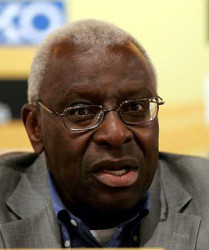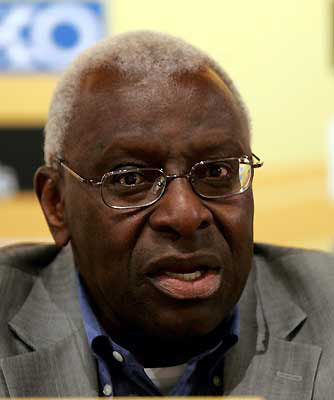BEIJING, (Reuters) – Outgoing IAAF President Lamine Diack has defended the work done by world athletics’ governing body to combat doping, saying yesterday the organisation had an “unparalleled” record among sports in detecting and punishing drug cheats.

The International Association of Athletics Federations has faced a string of accusations over the last three weeks that it neglected its duty to address the issue after the leak of blood test data to two media organisations.
“It’s a tricky problem to deal with but we constantly continue to discuss matters and introduce new measures,” he said in his opening remarks to the 50th IAAF Congress.
“Okay, a newspaper stole some information from our data bank but I think our officers have reacted in an admirable way.
“They have said, ‘this is what we have done, this is what we’re doing.’”
The Senegalese said the IAAF spent “millions of dollars” every year on fighting doping and had been instrumental in the setting up of the World Anti-Doping Agency.
He added that his organisation had been in the vanguard when it came to making penalties for doping tougher.
Diack’s 16 years in charge of the IAAF will come to an end later in the day when either Sergey Bubka or Sebastian Coe replaces him as president after a ballot of the 214 national federations.
Diack said that whoever won the vote would continue the work he had done in the fight to keep the sport clean, and rejected speculation that drug cheating was endemic in the sport.
“We will be holding these (world) championships in Beijing and people will say 80 percent of the athletes are bound to test positive,” he added.
“But no, this is totally untrue. We must resolve, of course, the problem of doping. All the champions must be tested regularly and each country must have its own anti-doping body.”
Diack said it was essential that the anti-doping effort must be engaged at the national level with all countries establishing bodies to conduct testing and mete out punishments.
“If measures are taken in Kenya, Morocco, Ethiopia, Turkey and elsewhere, that is what is required, this will enable us to solve the problem,” he said.
“We can’t do everything ourselves and we must propose these measures top all countries. The IAAF is prepared to provide financial support to foster national entities in Kenya, Uganda, Tanzania and so on.
“I’m sure that we will succeed.”

